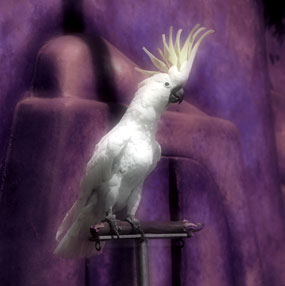
Sadly, cockatoos are the most commonly abandoned pet birds, left in shelters by owners who bought them on a whim and were simply unprepared for the day to day task of caring for them.
For example, there are cases when owners lavish attention at the start, but then begin ignoring the birds when the novelty has worn off. This makes the cockatoos feel abandoned, and they will release their confusion and unhappiness with screams, bites, and aggressive behavior. They are not being “bad” birds; they are communicating their displeasure—and rightly calling your attention to something they feel is wrong.
Cockatoos As Pets-How much care do they need?
Aside from food, clean cages, and regular grooming, cockatoos need intellectual stimulation and companionship. Cockatoos are social creatures whose need for stimulation and petting are as important as a clean bowl of water everyday. If you aren’t ready to give that kind of attention—maybe you’re away from home most of the day, or just aren’t the type who’d spend an hour each day just playing with the birds then don’t get cockatoos.
Cockatoos are also sensitive and temperamental, which has to be curbed with a very clear routine. Feed them and play with them at set times of the day, and from the get go, stop bad habits like biting or playing with their food. Cockatoos have the intelligence of four-year-olds, and like toddlers, they feel safer when they know what to expect and what is expected of them.
Cockatoos As Pets-Special habits and considerations
For some reason, feather plucking and mutilation happens more among cockatoos and African Grays. Severity can vary. Some birds just bite off the tips of the feathers; others pull the feathers out completely.
If they do this regularly, the skin follicles will become so damaged that the feathers will never grow back again.
If you notice your cockatoos are plucking out their feathers, bring them to the veterinarian immediately. There may be a physical or an emotional problem. For example, they may be suffering from zinc poisoning, excessively dry skin, bacterial infections, Vitamin A deficiency, tape worms, or giarda. Or they may be stressed out because of a big change in environment, or have become bored or depressed in captivity.
Some birds may start plucking during molting, or if their feathers have become ragged because of poorly done wing clipping. Always observe them more closely during molting season or in the first few weeks after their wings have been clipped.